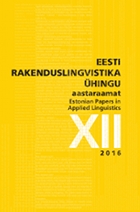Muutunud õpikäsituse keeleline konstrueerimine
Linguistic construction of a changed learning approach
Author(s): Katrin Aava, Halliki PõldaSubject(s): Applied Linguistics, Language acquisition, Sociolinguistics
Published by: Eesti Rakenduslingvistika Ühing (ERÜ)
Keywords: text linguistics; critical discourse analysis; changed learning approach; stakeholder; social innovation
Summary/Abstract: According to the Estonian Lifelong Learning Strategy 2020 of the Ministry of Education and Research, a changed learning approach is an approach supporting the individual and social development, learning skills, creativity and enterprisingness of a learner. The aim of the study is to describe which discourses are associated with the changed learning approach and whether they coincide with the indicators created in the official discourse. Also, the aim is to determine, based on language use, how the stakeholders themselves relate to the education innovation. Five focus groups were studied as stakeholders: teacher training faculty researchers, officials from education support bodies, education officials from local governments, school headmasters and teachers. The data collected from the interviews with focus groups were analysed by using the critical discourse analysis method. As the result, it appeared that the changed learning approach is connected with discourses formulated in educational documents and professional literature (discourse of the changed teacher-student relationship, changed learning environment discourse etc.), however, the descriptions of the stakeholders often do not refer to these changes. Almost all stakeholders formulated the need for cooperation but did not so much list the other stakeholders as a contributing factor. Therefore, it appeared that stakeholders saw other stakeholders more as preventive factors. The results of the study indicated that there are several contradictions between the descriptions of changed learning approach and an opposition is created where the participants handle the meanings of changed learning approach in the context of their own work. The new meanings of the changed learning approach are discussed but not used in practice.
Journal: Eesti Rakenduslingvistika Ühingu aastaraamat
- Issue Year: 2016
- Issue No: 12
- Page Range: 201-217
- Page Count: 17
- Language: Estonian

